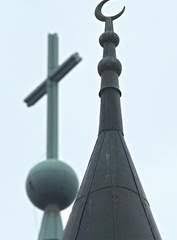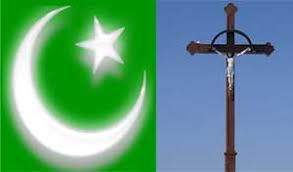Islam Vs Christianity History










Source(google.com.pk)
Christianity and Islam share a historical and traditional connection. The two faiths share a common origin in the Middle East[2] and Muslims consider Christians (and Jews) to be People of the Book. Belief in the Injil (the original Gospel of Jesus) is an important part of Islamic theology, although Muslims view the current Gospels as altered. The bond extends even further, with the Islamic Prophet Muhammad instructing Muslims to defend the Christian faith from aggressors after treaties of peace have been signed, such as in the document called the Achtiname of Muhammad. Islam and Christianity share the twin commandments of the paramount importance of loving God and loving one's neighbor, although the interpretations of these statements differ between the two traditions, and, indeed, vary between all three Abrahamic religions.[3]
Despite the similarities between the two faiths there are some major theological differences. Islam denies that God can be divided into a Trinity and consider this division of God's Oneness to be a grave sin (Shirk). Muslims see Jesus as the last prophet sent to the Children of Israel and the Messiah (Masih) miraculously born of the Virgin Mary (Maryām), but do not believe that he is the Son of God or divine.
Contents [show]
As Abrahamic religions [edit]
Islam and other religions
Hindu–Islamic relations Islamic–Jewish relations Christianity and Islam Islam and Jainism
Category Portal
v t e
Main article: Abrahamic religions
Christianity, Islam and Judaism are known as Abrahamic religions because of their common origin through Abraham. Muslims consider Ishmael (Ismā'īl), the first-born son of Abraham, to be the "Father of the Arabs" and Abraham's second son, Isaac (Isḥāq), is called "Father of the Hebrews". The story of Abraham and his sons is told in the Book of Genesis and the Qur'an but with certain differences.
Muslims commonly refer to Christians and Jews as "People of the Book", people who follow the same general teachings in relation to the worship of the One God (Tawhid) as known by Abraham.
The Catechism of the Catholic Church, the official doctrine document released by the Roman Catholic Church, has this to say regarding Muslims:
“ The Church's relationship with the Muslims. "The plan of salvation also includes those who acknowledge the Creator, in the first place amongst whom are the Muslims; these profess to hold the faith of Abraham, and together with us they adore the one, merciful God, mankind's judge on the last day." ”
(Catechism of the Catholic Church[4])
The Qur'an explicitly promises salvation for all those righteous Christians who were there before the arrival of Muhammad:
“ Lo! Those who believe (in that which is revealed unto thee, Muhammad), and those who are Jews, and Christians, and Sabaeans - whoever believeth in Allah and the Last Day and doeth right - surely their reward is with their Lord, and there shall no fear come upon them neither shall they grieve. ”
(Qur'an 2 (Al-Baqara), ayat 62[5])
The Qur'an also makes it clear that the Christians will be nearest in love to those who follow the Qur'an and praises Christians for being humble and wise:
“ And thou wilt find the nearest of them in affection to those who believe (to be) those who say: Lo! We are Christians. That is because there are among them priests and monks, and because they are not proud. When they listen to that which hath been revealed unto the messengers, thou seest their eyes overflow with tears because of their recognition of the Truth. They say: Our Lord, we believe. Inscribe us as among the witnesses.
How should we not believe in Allah and that which hath come unto us of the Truth. And (how should we not) hope that our Lord will bring us in along with righteous folk?
Allah hath rewarded them for that their saying—Gardens underneath which rivers flow, wherein they will abide for ever. That is the reward of the good. ”
(Qur'an:5 (Al-Ma'ida), ayat 82-85[6])
Similarities between the Bible and the Qur'an [edit]
The Qur'an contains many references to people and events that are mentioned in the Bible; that Jesus was given the Injil (Greek evangel, or Gospel) from the Abrahamic God. Traditionally, Muslims have believed that parts of these teachings were eventually lost or distorted to produce what is now the Hebrew Bible and the Christian New Testament.
Islamic views on Jesus [edit]
Part of a series on
Jesus in Christianity[show]
Jesus in Islam[hide]
Disciples of Jesus in Islam
Islamic view of Jesus' death
Jesus at the end of time The Mahdi
Gospel in Islam Mary in Islam
Background[show]
Jesus in history[show]
Perspectives on Jesus[show]
Jesus in culture[show]
Christianity portal
Islam portal
v t e
Main article: Jesus in Islam
Islam teaches that Jesus (Isa) was one of the most important prophets of God and was a human being. Muslims do not believe that he was the Son of God, nor that he is divine or part of a triune God as Christians believe. In Islam, Jesus was a human prophet who, like all the other prophets, tried to bring the children of Israel to the worship of One God. Muslims believe that Jesus was miraculously born of the Virgin Mary (Maryām). Muslims believe the creation of Jesus was similar to the creation of Adam (Adem) (the first prophet of God), they were both created by God without human fathers.
Islam and Christianity differ in their fundamental views in regard to the crucifixion and resurrection. Christians believe that Jesus was condemned to death by the Sanhedrin and the Roman prefect Pontius Pilate, physically crucified and resurrected. Muslims believe that Jesus was condemned to crucifixion and then miraculously saved:
That they (the Children of Israel) rejected Faith; that they uttered against Mary a grave false charge.
That they said (in boast), "We killed Christ Jesus the son of Mary, the Messenger of God."—but they killed him not, nor crucified him, but so it was made to appear to them, and those who differ therein are full of doubts, with no (certain) knowledge, but only conjecture to follow, for of a surety they killed him not.
Nay, Allah raised him up unto Himself; and God is Exalted in Power, Wise.
—Qur'an, sura 4 (An-Nisa), ayat 156-158[7]
It is said in John 14:2-3[8][9] and also in the Al-Quran 43:61[10] that Jesus will be sent again to earth at the end of time. He will fight against the Antichrist shortly before the Last Day.[11]
Both prophets have some similar teachings, e.g. Muhammad and Jesus Christ gave the lesson of monotheism which is mentioned in the book of Deuteronomy 6:4, in Mark 12:29[12] and in the Al-Quran 112:1-4.[13] Both are against division of God's oneness (shirk) which is written in Exodus 20:2-5 [14][15] and also in the Quran.[16] But this is another misunderstanding of what Islam and Christianity mean when they say, "God is one." The Old Testament is affirming that there is only one God, over and against all of the polytheistic religions in the Ancient Near East. Islam teaches the same thing but rejects that God is triune. According to Islam there is no diversity in God. For Christians, God's triune nature is fundamental orthodoxy.
Islamic views on the Trinity [edit]
Main articles: Islamic view of the Trinity and Holy Spirit (Islam)
Within Christianity, the doctrine of the Trinity states that God is a single being who exists, simultaneously and eternally, as a communion of three distinct persons, the Father, the Son and the Holy Spirit. Within Islam however, such a concept of plurality within God is a denial of monotheism, and foreign to the revelation found in Muslim scripture. The act of ascribing partners to God, whether they be sons, daughters, or other partners, is considered to be blasphemous in Islam. The Qur'an repeatedly and firmly asserts God's absolute oneness, thus ruling out the possibility of another being sharing his sovereignty or nature. Islam teaches Muslims that Jesus was a messenger of God and that he did not claim to be God's son. God is believed to be incomparable to all else. The Holy Spirit is generally believed[citation needed] to be the angel Gabriel.
The New Testament on Islam and Muhammad [edit]
Muslim preachers including Zakir Naik[17] and Ahmad Deedat argue that the Paraclete referred to in the Gospel of John (according to several scholars written near the end of the 1st century AD[18][19]) is a prophecy of the coming of Muhammad.
"Nevertheless I tell you the truth: It is expedient for you that I go away; for if I go not away, the Comforter will not come unto you; but if I go, I will send him unto you."
—John 16:7
In the Gospel of John (14:16, 15:26, and 16:7) the word often translated into English as "Comforter" is the Greek word Paracletos, a word with several shades of meaning, including both "advocate" and "comforter".[20] Muslims believe that the Greek word Paraclete refers to Muhammad.[citation needed] Christians believe that the Paraclete who comes in place of Christ is the Holy Spirit, who was manifested on the day of Pentecost.[21][22]
Early Christian writers [edit]
See also: Medieval Christian views on Muhammad
John of Damascus [edit]
In 746 John of Damascus (sometimes St. John of Damascus) wrote the Fount of Knowledge part two of which is entitled Heresies in Epitome: How They Began and Whence They Drew Their Origin.[23] In this work St. John makes extensive reference to the Koran and, in St. Johns's opinion, its failure to live up to even the most basic scrutiny. The work is not exclusively concerned with the Ismaelites (a name for the Muslims as they claimed to have descended from Ismael) but all heresy. The Fount of Knowledge references several suras directly often with apparent incredulity.
From that time to the present a false prophet named Mohammed has appeared in their midst. This man, after having chanced upon the Old and New Testaments and likewise, it seems, having conversed with an Arian monk, devised his own heresy. Then, having insinuated himself into the good graces of the people by a show of seeming piety, he gave out that a certain book had been sent down to him from heaven. He had set down some ridiculous compositions in this book of his and he gave it to them as an object of veneration. ... There are many other extraordinary and quite ridiculous things in this book which he boasts was sent down to him from God. But when we ask: ‘And who is there to testify that God gave him the book? And which of the prophets foretold that such a prophet would rise up?’—they are at a loss. And we remark that Moses received the Law on Mount Sinai, with God appearing in the sight of all the people in cloud, and fire, and darkness, and storm. And we say that all the Prophets from Moses on down foretold the coming of Christ and how Christ God (and incarnate Son of God) was to come and to be crucified and die and rise again, and how He was to be the judge of the living and dead. Then, when we say: ‘How is it that this prophet of yours did not come in the same way, with others bearing witness to him? And how is it that God did not in your presence present this man with the book to which you refer, even as He gave the Law to Moses, with the people looking on and the mountain smoking, so that you, too, might have certainty?’—they answer that God does as He pleases. ‘This,’ we say, ‘We know, but we are asking how the book came down to your prophet.’ Then they reply that the book came down to him while he was asleep.[citation needed]
Theophanes the Confessor [edit]
Theophanes the Confessor (died c.822) wrote a series of chronicles (284 onwards and 602-813 AD)[24][25][26] based initially on those of the better known George Syncellus. Theophanes reports about Muhammad thus:
At the beginning of his advent the misguided Jews thought he was the Messiah. ... But when they saw him eating camel meat, they realized that he was not the one they thought him to be, ... those wretched men taught him illicit things directed against us, Christians, and remained with him.
Whenever he came to Palestine he consorted with Jews and Christians and sought from them certain scriptural matters. He was also afflicted with epilepsy. When his wife became aware of this, she was greatly distressed, inasmuch as she, a noblewoman, had married a man such as he, who was not only poor, but also an epileptic. He tried deceitfully to placate her by saying, ‘I keep seeing a vision of a certain angel called Gabriel, and being unable to bear his sight, I faint and fall down.’
Nicetas [edit]
In the work A history of Christian-Muslim relations[27] Hugh Goddard mentions both John of Damascus and Theophanes and goes on to consider the relevance of Nicetas[clarification needed] of Byzantium who formulated replies to letters on behalf of Emperor Michael III (842-867). Goddard sums up Nicetas' view:
In short, Muhammad was an ignorant charlatan who succeeded by imposture in seducing the ignorant barbarian Arabs into accepting a gross, blaspheming, idolatrous, demoniac religion, which is full of futile errors, intellectual enormities, doctrinal errors and moral aberrations.
Goddard further notes that in Nicetas we can see in his work a knowledge of the whole Koran including an extensive knowledge of suras 2-18. Nicetas account from behind the Byzantine frontier apparently set a strong precedent for later writing both in tone and points of argument.
Old French [edit]
The medieval Christian belief that Muslims were idolatrous (that is, worshipped Mohammed as a rival to God/Allah) passed into the French language with the word mahomet or mahommet, meaning an idol. It later became two words in English-mammet or mawmet, meaning a false god. All words are now out of use.[28]
Nostra Aetate [edit]
The question of Islam was not on the agenda when Nostra Aetate was first drafted, or even at the opening of the Second Vatican Council. However, as in the case of the question of Judaism, several events came together again to prompt a consideration of Islam. By the time of the Second Session of the Council in 1963 reservations began to be raised by bishops of the Middle East about the inclusion of this question. The position was taken that either the question will not be raised at all, or if it were raised, some mention of the Muslims should be made. Melkite patriarch Maximos IV was among those pushing for this latter position.
Early in 1964 Cardinal Bea notified Cardinal Cicognani, President of the Council's Coordinating Commission, that the Council fathers wanted the Council to say something about the great monotheistic religions, and in particular about Islam. The subject, however, was deemed to be outside the competence of Bea's Secretariat for the Promotion of Christian Unity. Bea expressed willingness to "select some competent people and with them to draw up a draft" to be presented to the Coordinating Commission. At a meeting of the Coordinating Commission on 16–17 April Cicognani acknowledged that it would be necessary to speak of the Muslims.[29]
The period between the first and second sessions saw the change of pontiff from Pope John XXIII to Pope Paul VI, who had been a member of the circle (the Badaliya) of the Islamologist Louis Massignon. Pope Paul VI chose to follow the path recommended by Maximos IV and he therefore established commissions to introduce what would become paragraphs on the Muslims in two different documents, one of them being Nostra Aetate, paragraph three, the other being Lumen Gentium, paragraph 16.[30]
The text of the final draft bore traces of Massignon's influence. The reference to Mary, for example, resulted from the intervention of Monsignor Descuffi, the Latin archbishop of Smyrna with whom Massignon collaborated in reviving the cult of Mary at Smyrna. The commendation of Muslim prayer may reflect the influence of the Badaliya.[30]
In Lumen Gentium, the Second Vatican Council declares that the plan of salvation also includes Muslims, due to their professed monotheism.[31]
Pictures Photos Pics 2013
Pictures Photos Pics 2013
Pictures Photos Pics 2013
Pictures Photos Pics 2013
Pictures Photos Pics 2013
Pictures Photos Pics 2013
Pictures Photos Pics 2013
Pictures Photos Pics 2013
Pictures Photos Pics 2013
Pictures Photos Pics 2013
Pictures Photos Pics 2013
No comments:
Post a Comment